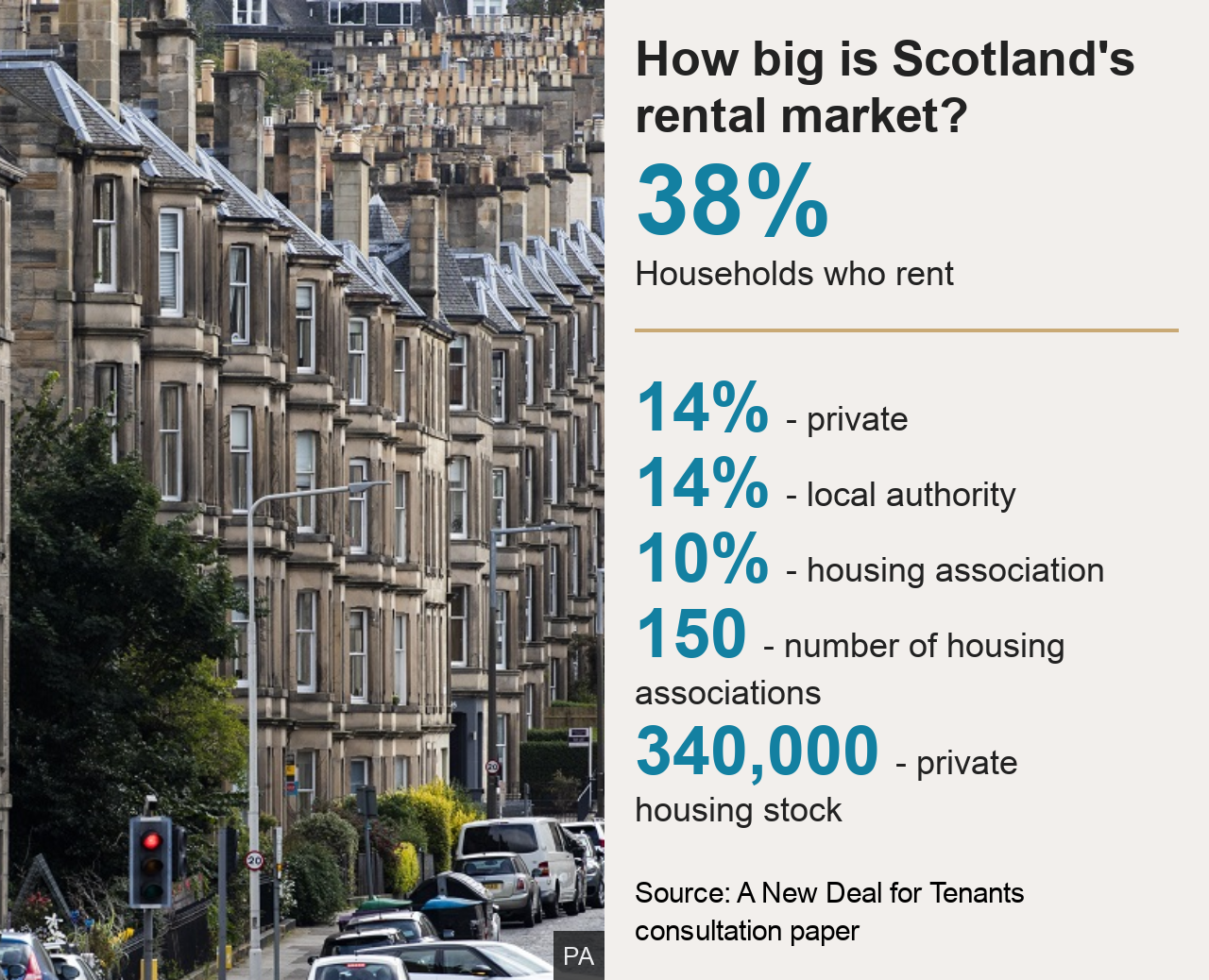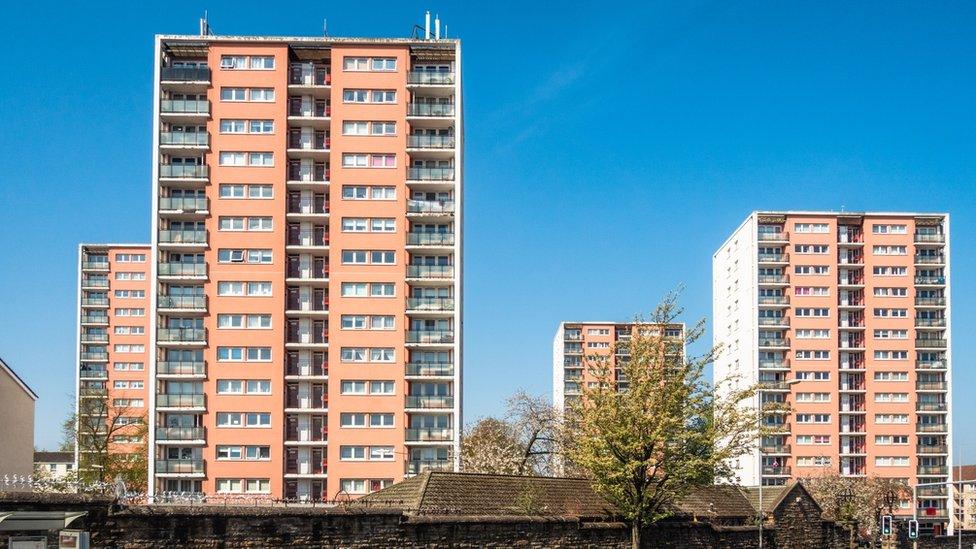Rental housing market 'completely unsustainable', MSPs told
- Published
- comments

Scotland's rental housing market is "completely unsustainable" in light of the cost of living crisis, MSPs have been told.
The warning came before emergency legislation, which would freeze most rents until the end of March 2023, passed its first stage on Tuesday.
A Holyrood committee heard some rents had soared by as much as 30%.
But landlord representatives said the government's plans would force many of its members to quit the sector.
The Cost of Living (Protection of Tenants) (Scotland) Bill, external is being fast-tracked through the Scottish parliament's scrutiny process.
MSPs backed the general principles of the legislation by 88 votes to 29 on Tuesday.
Stage two amendments will now be taken on Wednesday before a final vote on Thursday.
The Scottish Conservatives had voiced their opposition to the move, as the legislation was only introduced and published on Monday evening.
Tenants' Rights Minister Patrick Harvie has described the bill as an "emergency response" to the cost of living crisis but on Tuesday he vowed it would strike a balance.
There are exceptions to the rent freeze where a landlord faces increased property costs, mortgage interest payments and some insurance costs.
The legislation also provides for a six-month moratorium on evictions.
'Completely unsustainable'
Caroline Crawley, from Living Rent, told the local government, housing and planning committee that action was necessary as tenants had been hit hard by the current economic climate.
She said: "Everyone is in a crisis, but tenants especially.
"Foodbank use has gone up and energy bills are spiralling and rents just keep increasing at insane rates.
"The current market value is completely unsustainable."
Ms Crawley added that the situation was so severe that renting was "truly unaffordable" for people who were working, let alone those on benefits.

Aaron Hill, from the Scottish Federation of Housing Associations (SFHA), expressed concern that if a rent freeze was extended beyond 31 March it would be ineffective and prevent long-term solutions from being pursued.
Mr Hill told MSPs there was strong evidence government intervention was not required beyond that date and called for "stability and certainty".
His evidence came after SFHA chief executive Sally Thomas cautioned the plans would have "serious, unintended consequences".
She added that the majority of social tenants would see little difference to their incomes as a result of a rent freeze as between 60-70% of social housing tenants had their rents covered by welfare benefits paid by the UK government.
Ms Thomas said: "With rent being a vital source of income for our members, it would result in housing associations being forced to cut back on vital support services for tenants, the development of new homes, improvements to existing stock and the pursuit of net zero targets."

Scottish Association of Landlords chief executive John Blackwood has criticised the proposals
Scottish Association of Landlords chief executive John Blackwood told the committee the bill was not proportionate as his members were also affected by the cost of living crisis.
He said interest rates on mortgages were going up and access to mortgages was going to become a major problem for investors.
Mr Blackwood added: "Some existing landlords will quite frankly not be able to continue."
He also told MSPs he was worried about investor confidence in the private rented sector.
Timothy Douglas, from Propertymark, which represents letting agents, argued the plans would reduce supply and increase rents further.
'Critical temporary protection'
Mr Harvie told the committee it would provide "critical temporary protection" for people who rented their homes.
He added: "The legislation that we are proposing will help to keep people in their homes and will help stabilise their housing costs during this extraordinary cost crisis.
"We believe the package of measures strikes the right balance between this aim and ensuring landlords can continue to offer properties for rent and manage tenancies sustainably."
But Scottish Conservative housing spokesman Miles Briggs said the government's plan would do little to increase the incomes of most social or private tenants.
He also accused the coalition of going after a "good headline" and warned the bill would have a serious impact on the delivery of new homes.
Mr Briggs added: "We already have a record number of people living in temporary accommodation in Scotland, and this bill has the potential to supercharge the current housing crisis."
Patrick Harvie says that evictions may still take place where there are cases of "substantial rent arrears"
Scottish Liberal Democrat economy spokesman Willie Rennie said including the social housing sector in the bill risked undermining housing associations, councils and charities.
He added: "Those homes are already subject to rent controls, so I don't think it would be right to impose another set of controls with a freeze."
Meanwhile, the Scottish Property Federation (SPF) warned the legislation would only worsen the "chronic undersupply" of rental housing across both public, private and student accommodation.
SPF director David Melhuish added that housing providers were not responsible for the cost of living crisis but had been "singled out" by the Scottish government's proposals.
He added: "New housing must become the policy priority, not blunt instruments singling out landlords, many of whom work hard to support their tenants."
If approved, the bill will give ministers temporary power to cap rents for private and social tenancies, with this cap set at 0%.
It covers the period from 6 September until at least 31 March and includes the further power to maintain or vary the rent cap over two further six-month periods.
The bill also proposes that the enforcement of eviction actions resulting from the current economic climate will be prevented over the same period, except in a number of specified circumstances.
Safeguards for both social and private sector landlords, as well as providers of college and university halls and other purpose-built student accommodation, are included in the provisions on evictions.
Related topics
- Published4 October 2022

- Published7 September 2022

- Published6 September 2022

- Published6 September 2022

- Published6 September 2022
